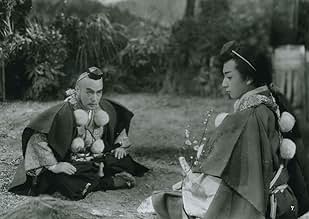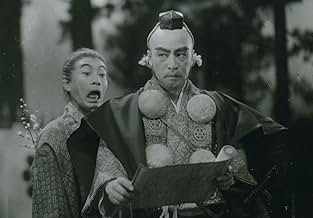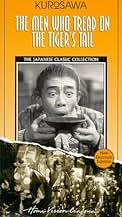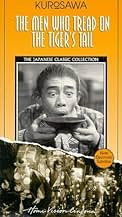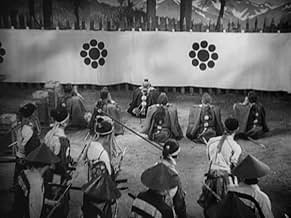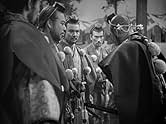IMDb-BEWERTUNG
6,7/10
4683
IHRE BEWERTUNG
Ein japanischer General und seine Männer verkleiden sich als Mönche, um an einer feindlichen Grenzpatrouille vorbeizufahren.Ein japanischer General und seine Männer verkleiden sich als Mönche, um an einer feindlichen Grenzpatrouille vorbeizufahren.Ein japanischer General und seine Männer verkleiden sich als Mönche, um an einer feindlichen Grenzpatrouille vorbeizufahren.
- Regie
- Drehbuch
- Hauptbesetzung
Empfohlene Bewertungen
Akira Kurosawa was, well, a genius.
This early film is only further proof.
Before he made Rashomon, the Seven Samurai and Ran he made this and it's great.
The cast is fantastic. Kenichi Enomoto is especially great as the porter. That character is brilliant comic relief, which is especially evident in the scene where he attempts to dance.
Jason Biggs doing a stupid dance in American Pie is not funny. Kenichi Enomoto doing a stupid dance in Tora no o wo fumu otokotachi is.
The rest of the cast is great, too.
The characters are wonderful. There's of course the cowardly porter, and the clever character who, pretending to be a monk, has to think quickly and it's fun to watch.
Not only that, there is some very fine music and dialogue in this.
Only problem: Too short. . . but then again, I could say the same about the Seven Samurai and Ran. A great movie is always too short.
Highly recommended.
This early film is only further proof.
Before he made Rashomon, the Seven Samurai and Ran he made this and it's great.
The cast is fantastic. Kenichi Enomoto is especially great as the porter. That character is brilliant comic relief, which is especially evident in the scene where he attempts to dance.
Jason Biggs doing a stupid dance in American Pie is not funny. Kenichi Enomoto doing a stupid dance in Tora no o wo fumu otokotachi is.
The rest of the cast is great, too.
The characters are wonderful. There's of course the cowardly porter, and the clever character who, pretending to be a monk, has to think quickly and it's fun to watch.
Not only that, there is some very fine music and dialogue in this.
Only problem: Too short. . . but then again, I could say the same about the Seven Samurai and Ran. A great movie is always too short.
Highly recommended.
In 1185, the Seike family fights against the Minamoto family. After a bloody naval battle in the Pacific Ocean, Yoshitsune Minamoto (Shubo Nishina) defeats the enemy and the survivals commit suicide. When the triumphant Yoshitsune arrives in Kyoto, his brother, the Shogun Ioromoto, is lured and orders his men to arrest Yoshitsune. However, Yoshitsune escapes with six loyal samurais led by Benkei (Denjirô Ôkôchi) and they head to the country of his only friend Idehira Fukiwara.
Nearby the border, after crossing the forest disguised as monks, their smiley conveyor Suruga (Yoshio Kosugi) discloses that they are Yoshitsune and the six samurais and advises that the fearful Kagiwara and his soldiers are waiting for them in the border to arrest them. Yoshitsune disguises as a carrier and Benkei has to convince Kagiwara that they are six monks traveling to collect donation to build a large temple in Kyoto.
"Tora no o wo Fumu Otokotachi" is the third feature of Master Akira Kurosawa that shows his talent even with very limited budget. The acting is superb and Denjirô Ôkôchi performs a very wise samurai. Yoshio Kosugi is annoying and funny at the same time, with his chuckles. The conclusion is a little disappointing and gives the sensation that the story will be continued. The subtitles in the Brazilian DVD from Continental Distributor have synchronicity problems many times, and I had to use the rewind to read them. My vote is seven.
Title (Brazil): "Os Homens que Pisaram na Cauda do Tigre" ("The Men that Stepped on the Tail of the Tiger")
Nearby the border, after crossing the forest disguised as monks, their smiley conveyor Suruga (Yoshio Kosugi) discloses that they are Yoshitsune and the six samurais and advises that the fearful Kagiwara and his soldiers are waiting for them in the border to arrest them. Yoshitsune disguises as a carrier and Benkei has to convince Kagiwara that they are six monks traveling to collect donation to build a large temple in Kyoto.
"Tora no o wo Fumu Otokotachi" is the third feature of Master Akira Kurosawa that shows his talent even with very limited budget. The acting is superb and Denjirô Ôkôchi performs a very wise samurai. Yoshio Kosugi is annoying and funny at the same time, with his chuckles. The conclusion is a little disappointing and gives the sensation that the story will be continued. The subtitles in the Brazilian DVD from Continental Distributor have synchronicity problems many times, and I had to use the rewind to read them. My vote is seven.
Title (Brazil): "Os Homens que Pisaram na Cauda do Tigre" ("The Men that Stepped on the Tail of the Tiger")
One can, for the first time, in my opinion, see what Kurosawa could do. He follow a group. of men trying to get through a checkpoint, disguised as priests. Their leader is disguised as a porter and therefore must dishonored to be protected. This is all part of a legend in ancient China and the audiences pretty much knew the story. Kurosawa provides comic relief with the true porter who is an unforgettable character. He is one of those pests that drives one crazy, yet he is so persistent in his efforts to be included. Apparently, historically, things don't bode well for the future but the standoff that occurs as they pretty much risk their lives to get through is quite breathtaking. There are incredible images of the landscape and the use of closeups is vibrant and sharp. The porter's dance at the end is terrific, against a bank of clouds, silhouetted against the sky.
The movie is seemingly based on an event from Japan's past, but it is really Kurosawa's allegory on Japan's condition at the end of World War Two. A prince, estranged from his brother, and six of his loyal retainers wander through the forest. They all look disheveled and hard up. They must cross a barrier manned by officials who are not exactly friendly to them, before they can move on to improving their life. The prince is disguised as a lowly porter and we rarely see his face. his retainers are warriors but are now forced to don monk's robes and indeed in passing through the barrier manned by the unfriendly forces (read American's) the lead monk must read a treatise in which peace is extolled as the reason for their existence. basically, the monks are Japanese elite, the porter is the Japanese public, the prince is the emperor, the barrier officials are the Americans, whose leader is wise and although he knows the truth allows the monks to live. They are many truths within truths here. Indeed, in the end the adviser to the emperor says, "we must move on (read from the feudal system) if we are to survive". a very fine movie, short yet poignant. one can easily see even in this early feature of his that Kurosawa is a master at symbolic imagery. By the way this movie was made in 1945, but not released in Japan until 1952. After watching it, I can see why it was delayed. It would have been extremely painful as a Japanese citizen to watch this in 1945, with their country in shambles around them. highly recommended.
This is a very intelligent movie, telling the story of two men who ride the tiger's tail out of loyalty and grace. The courage of one of them is explicitly portrayed in the film. It is the samurai Benkei who cleverly defends his lord at a very high personal risk. Benkei improvises an eloquent speech reading out of a blank scroll the prospectus for the temple when required to do so by the commander of the military outpost seeking to capture his master. Benkei uses logic to convince his comrades that it is not a good idea to fight the soldiers of the barrier. The samurai may kill all the soldiers this time but that will result in more soldiers and more persecution later on. Benkei uses a clever trick, to flog his master who is posing as a porter when the second-in-command suspects that the porter is the master they are trying to capture. Since a servant would never beat his master, the porter cannot be the master, reasons the top commander.
But more impressive than Benkei is the street-wise guy, the real porter played by Kenichi Enomoto, who joins the party of samurai in the forest. He treads on two tigers' tails. The first tiger is represented by the party of samurai. He is rejected by them, he is called a nobody, he is treated harshly, he is even threatened with death. He disappears at times but he returns to help the samurai who walk in the forest pretending to be itinerant priests. He collects information valuable to them and shares that information. And the second tiger is the military outpost who will surely kill him if they discover that the master is among the party of fake itinerant priests.
While Benkei does his heroic deeds in a ceremonial manner framed by rituals and high tension, the loquacious porter does his heroic deeds in a discreet, even awkward manner, without fanfare or rituals. His heroism is so discreet that even seasoned Kurosawa critics missed the point of the movie: natural, humble heroism offered not out of loyalty, but out of grace.
(The master of the party of samurai is such an obscure figure that out of respect to Kurosawa I have not even mentioned his name in my review)
But more impressive than Benkei is the street-wise guy, the real porter played by Kenichi Enomoto, who joins the party of samurai in the forest. He treads on two tigers' tails. The first tiger is represented by the party of samurai. He is rejected by them, he is called a nobody, he is treated harshly, he is even threatened with death. He disappears at times but he returns to help the samurai who walk in the forest pretending to be itinerant priests. He collects information valuable to them and shares that information. And the second tiger is the military outpost who will surely kill him if they discover that the master is among the party of fake itinerant priests.
While Benkei does his heroic deeds in a ceremonial manner framed by rituals and high tension, the loquacious porter does his heroic deeds in a discreet, even awkward manner, without fanfare or rituals. His heroism is so discreet that even seasoned Kurosawa critics missed the point of the movie: natural, humble heroism offered not out of loyalty, but out of grace.
(The master of the party of samurai is such an obscure figure that out of respect to Kurosawa I have not even mentioned his name in my review)
Wusstest du schon
- WissenswertesProduction had to be halted briefly during production of the film as Japan surrendered, bringing an end to the hostilities of World War II. Akira Kurosawa recollected breaking during production to listen to the address by Emperor Hirohito on August 15th, 1945.
- VerbindungenFeatured in Great Performances: Kurosawa (2000)
Top-Auswahl
Melde dich zum Bewerten an und greife auf die Watchlist für personalisierte Empfehlungen zu.
- How long is The Men Who Tread on the Tiger's Tail?Powered by Alexa
Details
- Erscheinungsdatum
- Herkunftsland
- Sprache
- Auch bekannt als
- The Men Who Tread on the Tiger's Tail
- Drehorte
- Toho Studios, Tokio, Japan(Studio)
- Produktionsfirma
- Weitere beteiligte Unternehmen bei IMDbPro anzeigen
- Laufzeit59 Minuten
- Farbe
- Sound-Mix
- Seitenverhältnis
- 1.37 : 1
Zu dieser Seite beitragen
Bearbeitung vorschlagen oder fehlenden Inhalt hinzufügen

Oberste Lücke
By what name was Die Tigerfährte (1945) officially released in Canada in English?
Antwort
